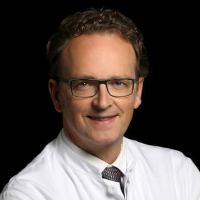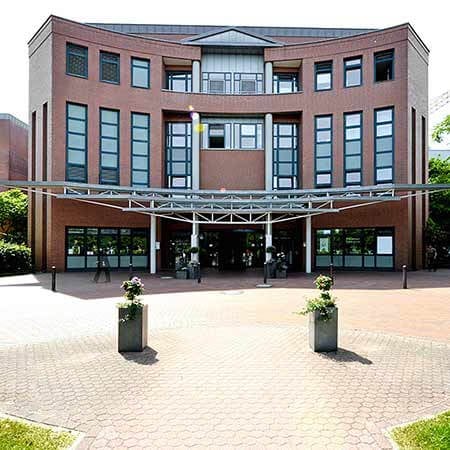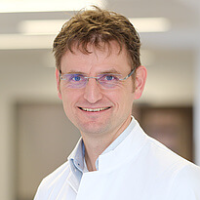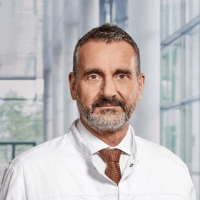Reconstruction and Coronary Artery Bypass Surgery for Atrial Septal Defect (ASD) After Myocardial Infarction treatment in Germany
Treatment prices are regulated by national law of the corresponding countries, but can also include additional hospital coefficients. In order to receive the individual cost calculation, please send us the request and medical records.

Department of Cardiothoracic Surgery
According to the Focus magazine, the Department of Cardiothoracic Surgery ranks among the top German medical facilities specializing in the surgical treatment of diseases of the cardiovascular system and lung cancer! The department offers the full range of surgical services for the treatment of diseases of the cardiovascular system, respiratory tract, including heart and lung transplantation, artificial heart implantation. The therapeutic options include aortic surgery, coronary artery bypass grafting, transplantation surgery, surgical treatment of heart rhythm disorders (arrhythmias), minimally invasive surgery, surgical treatment of the heart valves, including reconstructive interventions. All operations are performed using state-of-the-art technology and in accordance with the current recommendations of professional societies.






Department of Cardiac Surgery
The Department of Cardiac Surgery provides a full range of surgical treatment in its area of specialization. Special emphasis is placed on heart valve repair and replacement surgery, coronary artery bypass grafting, thoracic aortic surgery, adult congenital and acquired heart disease surgery, pacemaker and defibrillator implantation, and artificial heart implantation for severe heart failure. Many heart operations are performed using minimally invasive techniques, which has a positive effect on the healing of the surgical wound. Minimally invasive cardiac procedures also reduce surgical risks and contribute to a rapid recovery of the patient in the postoperative period. Surgical treatment of cardiac pathologies is performed in advanced operating rooms equipped with the latest technology. The cardiac surgeons of the department successfully perform routine and complex surgical procedures, saving the lives of thousands of patients. The specialists work in accordance with current clinical protocols and follow the recommendations of the German Society for Thoracic and Cardiovascular Surgery (DGTHG).


Department of Cardiothoracic Surgery and Vascular Surgery
The Department of Cardiothoracic Surgery and Vascular Surgery provides effective surgical treatment for diseases of the heart, respiratory system, and blood vessels. The team of cardiac surgeons operates on patients with heart valve pathologies, coronary heart disease, heart failure, and heart rhythm disturbances. In the field of thoracic surgery, the key focus is on the surgical removal of lung tumors and lung metastases. The specialists in this area also perform surgery to repair chest wall deformities. In the field of vascular surgery, interventions for abdominal and thoracic aortic aneurysms are most often performed here. The department's vascular surgeons are also exceptionally competent in the treatment of peripheral occlusive arterial disease. A great advantage for the department's patients is that almost all surgical interventions are performed using minimally invasive techniques, so there is no need for a long postoperative recovery. The department's operating rooms are equipped with state-of-the-art technology. This allows for effective and safe treatment. The priority is always personalized medical care for patients.






A myocardial infarction develops due to a sudden deterioration in the blood supply to the myocardium. Part of the heart muscle dies. In this case, a defect may form in the interatrial septum, which requires elimination as it has a bad effect on hemodynamics and increases the risk of a stroke. The treatment of an atrial septal defect (ASD) and coronary heart disease involves an operation. Doctors can perform coronary artery bypass grafting with simultaneous reconstruction of the interatrial septum. You can undergo your treatment in Germany. Surgical treatment after a heart attack will be safe and effective here. You can find out the cost of treatment in Germany on the Booking Health website.
Content
- What is coronary artery bypass grafting?
- What is an atrial septal reconstruction?
- How is surgery for an atrial septal defect after a myocardial infarction performed?
- Where to undergo your treatment for an atrial septal defect after a myocardial infarction?
What is coronary artery bypass grafting?
Coronary artery bypass (CABG) is the main operation for the treatment of coronary heart disease in cardiology. This is the most reliable surgical procedure because it allows doctors to create new pathways for myocardial blood supply.
Bypass surgery means the creation of bypasses, that is, new blood vessels that will carry blood around the narrowed sections of the coronary arteries. Conduits, which are fragments of the patient's own blood vessels, are used for bypass grafting. The internal thoracic artery is usually taken for treatment, while veins are rarely used. In recent years, the use of lower limb veins has been abandoned in Germany since the long-term results of treatment with their use are worse.
When performing coronary artery bypass grafting, doctors form from 3 to 11 bypasses that carry blood from the aorta to the coronary vessels, but enter them further than the narrowing and closer to the heart. Bypass grafting results in the complete restoration of the normal blood supply to the myocardium. After the completion of treatment, a person no longer suffers from angina attacks and tolerates physical activity much better. In addition, coronary artery bypass grafting reduces the risk of recurrent myocardial infarction.
What is an atrial septal reconstruction?
After a heart attack, defects may appear in the septum of the heart. This is one of the complications after a heart attack that requires treatment. Otherwise, blood from the venous part of the heart enters the arterial part. Thrombi can penetrate through the hole and then enter the systemic circulation. The presence of a defect in the septum between the atria increases the risk of a stroke and also impairs heart function.
At German hospitals, the closure of atrial defects is performed simultaneously with bypass surgery. When performing treatment, doctors dissect the right atrium and close the hole with a patch. It is fixed to the normal areas of tissue that have not been damaged by the heart attack. The heart wall is then sutured.
How is surgery for an atrial septal defect after a myocardial infarction performed?
In the classical version, the operation is performed through a large incision in the center of the chest. Doctors connect a patient to a heart-lung machine. Although the operation lasts for a long time, the device completely replaces the function of the heart: it takes blood from the body, saturates it with oxygen, and returns it.
Surgeons at some hospitals specializing in cardiosurgery perform coronary artery bypass grafting and atrial septal reconstruction using an endoscopic technique. Doctors use the da Vinci surgical system. This method allows the procedure to be performed through four small chest incisions, one of which is about 5 cm long, and the other three are up to 2 cm long.
Such an intervention is less traumatic. After the completion of treatment, patients do not need a long time to restore respiratory function and sternum fusion. They are less likely to suffer complications, experience less discomfort in the early period after surgical treatment, become more active after surgery, and return to their normal lives faster. The aesthetic outcomes of the treatment are also improved due to the absence of large scars on the chest.
Where to undergo your treatment for an atrial septal defect after a myocardial infarction?
You can undergo your surgical treatment at one of the German hospitals. You are welcome to use the Booking Health service to find the best Cardiovascular Surgery Center, see the cost of treatment in Germany, and compare prices. On our website, you can immediately make your treatment appointment for your preferred dates.
Treatment at German hospitals has the following benefits:
- Germany is one of the world's leading countries in the treatment of heart disease;
- modern Cardiology Centers with state-of-the-art technology;
- experienced cardiac surgeons who have a high reputation all over the world;
- successful treatment even in the most complex clinical cases;
- a low risk of complications after the completion of treatment;
- treatment of several heart diseases at once in one operation;
- application of the latest technologies for the treatment of diseases in cardiology and cardiosurgery;
- application of robot-assisted surgical systems;
- comprehensive rehabilitation upon the completion of treatment.
When you make your treatment appointment through the Booking Health service, the cost of treatment in Germany will be lower for you than if you contact the Cardiosurgery Hospital directly. Prices for treatment are reduced due to the absence of taxes for foreign patients.
The Booking Health specialists will take care of all the arrangements for your treatment in Germany. We will help you select a Cardiology Hospital, make a treatment appointment on your preferred dates, and translate your medical documents. We will also book the nearest hotel to the hospital and airline tickets. Our company's employees will meet you at the airport and take you to the hospital by car. Upon the completion of your treatment, you will be taken back to the airport.
Authors:
The article was edited by medical experts, board-certified doctors Dr. Nadezhda Ivanisova and Dr. Vadim Zhiliuk. For the treatment of the conditions referred to in the article, you must consult a doctor; the information in the article is not intended for self-medication!
Sources:

